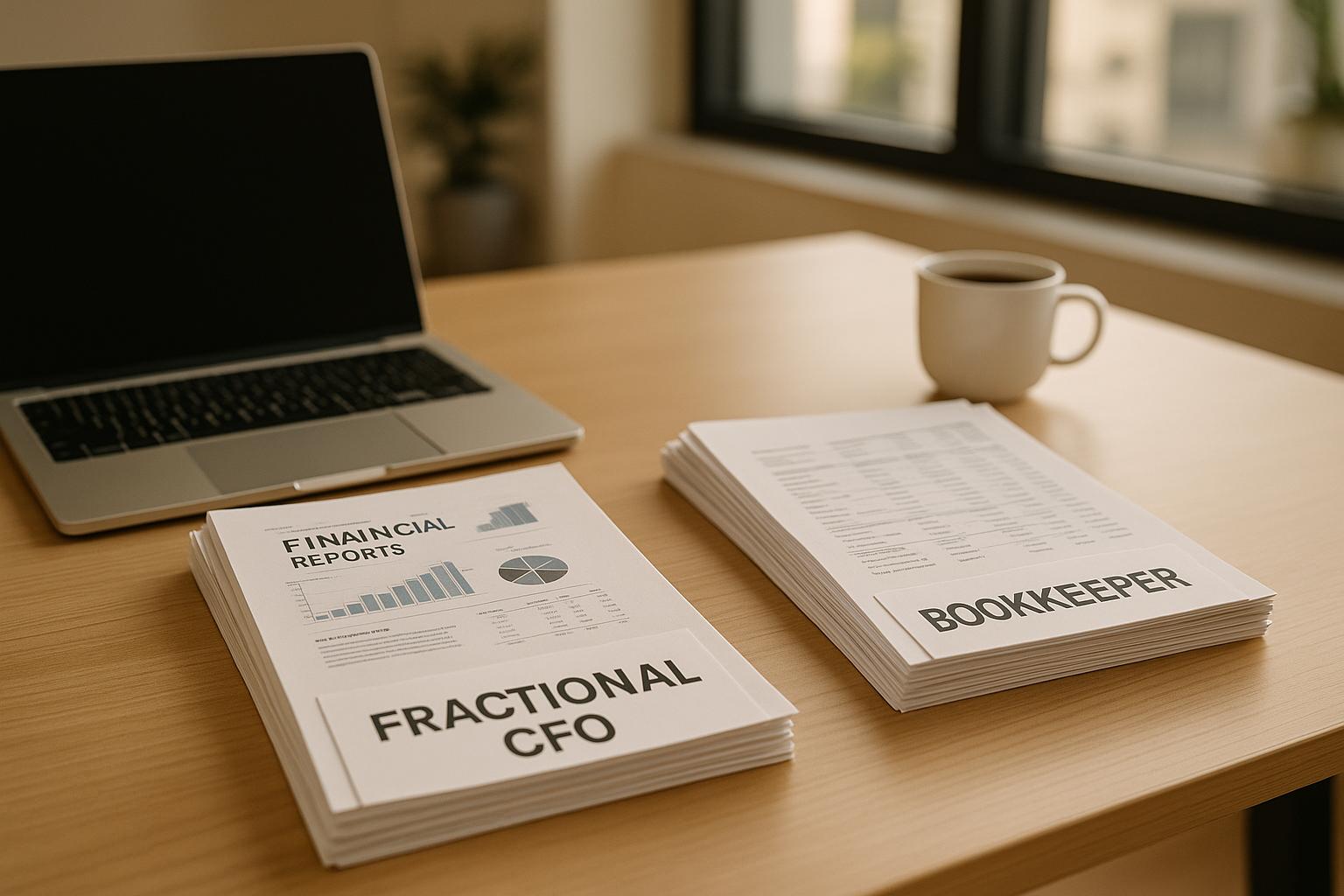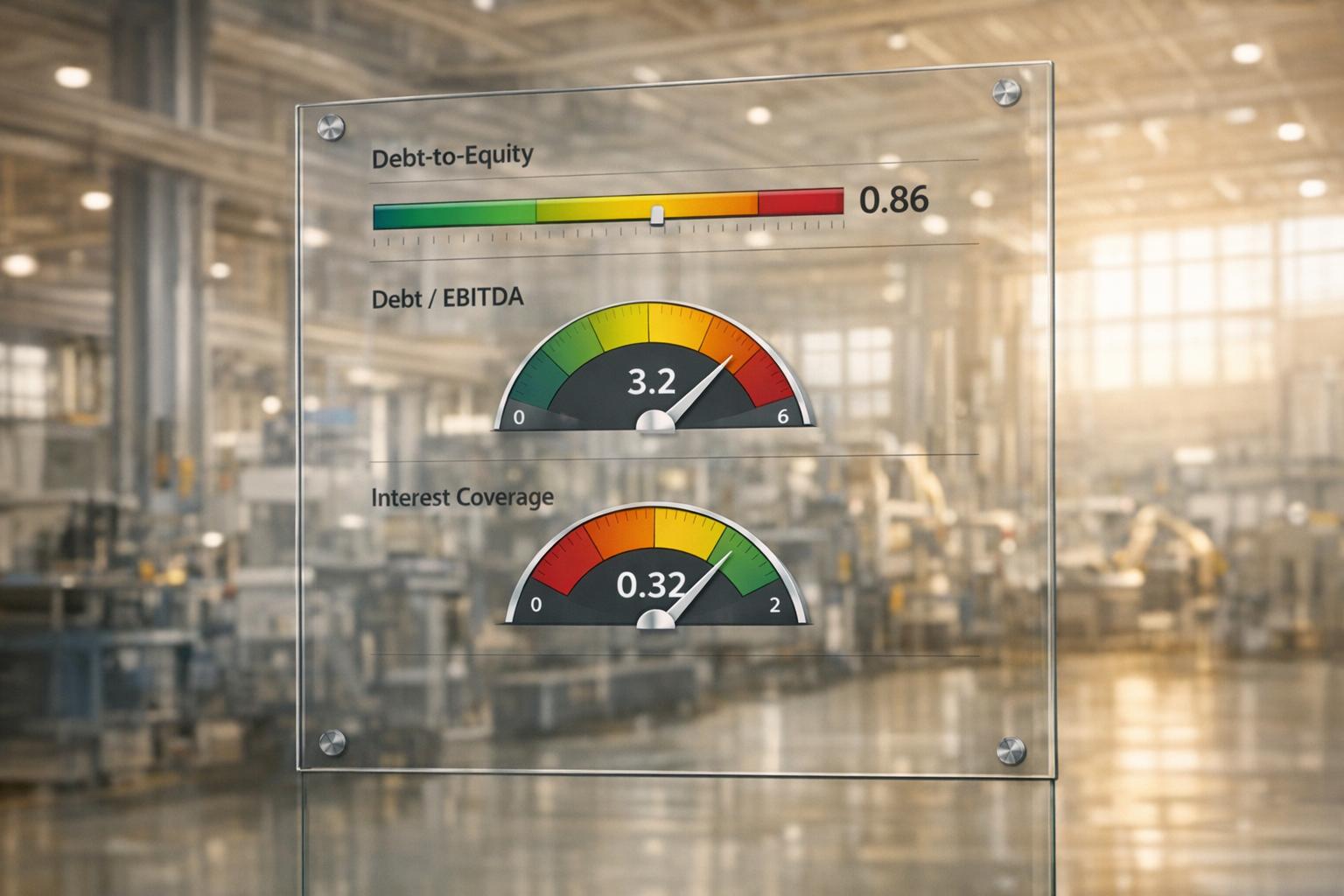Fractional CFO vs. Bookkeeper: Which to Hire?

As your business grows, so do the complexities of managing its finances. For founders and entrepreneurs scaling operations to reach $5 million or more in annual revenue, understanding the distinctions between financial roles like bookkeepers, accountants, and fractional CFOs is critical. While it may be tempting to stick with affordable bookkeeping services, this choice could limit your company’s growth potential if you’ve already outgrown the scope of their services.
This article explores the key differences between a fractional CFO and a bookkeeper, highlighting when and why you might need each, and how upgrading to a strategic financial partner can transform your business.
Understanding Financial Roles: Bookkeeper vs. Fractional CFO
At first glance, a bookkeeper and a fractional CFO may seem to serve overlapping functions, but their roles differ significantly in scope, depth, and strategic impact.
What Does a Bookkeeper Do?
A bookkeeper’s primary responsibility is to organize and maintain your financial records. They handle tasks such as:
- Recording transactions
- Reconciling accounts
- Generating basic profit and loss (P&L) reports
Think of a bookkeeper as the foundational layer of your financial team. They ensure that your business's financial data is accurate and up-to-date. However, bookkeepers typically operate at a surface level, offering little in terms of analysis or forward-looking insights. Their priorities are compliance and organization - not strategy.
The Role of a Fractional CFO
On the other hand, a fractional CFO (Chief Financial Officer) brings a higher-level strategic perspective. Rather than focusing on financial recordkeeping, a fractional CFO is tasked with:
- Analyzing financial data to drive decision-making
- Forecasting future cash flow and revenue trends
- Developing growth strategies
- Identifying key performance indicators (KPIs) and monitoring them
- Advising on funding, mergers, acquisitions, and exit strategies
A fractional CFO becomes a trusted partner in your business’s growth, converting raw data into actionable insights. Their focus is future-oriented and strategic, ensuring your business is scalable and financially secure.
The Case for Upgrading to a Fractional CFO
When Bookkeeping Alone Isn’t Enough
If you’re generating $5 million or more in revenue, you may have noticed that receiving monthly financial reports from a bookkeeper no longer provides the clarity you need. Why? Because:
- Reports lack actionable insights: While you have access to well-organized data, it doesn’t tell you how to allocate resources, optimize cash flow, or identify growth opportunities.
- Limited business understanding: Most bookkeepers manage several clients simultaneously, which often means they lack deep knowledge of your industry or specific business challenges.
- No strategic support: Bookkeepers are focused on past data. They are unlikely to provide the forward-thinking guidance you need to make informed decisions about the future.
The Strategic Value of a Fractional CFO
A fractional CFO provides the bridge between raw data and strategic action. They don’t just compile reports; they interpret them to help you make informed decisions. Hiring a fractional CFO becomes especially valuable when:
- You’re preparing to scale beyond your current financial systems.
- You’re considering raising capital, merging, or acquiring another company.
- You don’t have the budget for a full-time CFO but need high-level expertise.
Unlike a full-time hire, a fractional CFO offers the flexibility to access expertise when you need it without the overhead costs of a dedicated employee. For example, instead of paying $150,000 to $200,000 annually for a full-time controller, a fractional CFO provides comparable value at a fraction of the cost.
Why a Fractional CFO Is Not Just a ‘More Expensive Bookkeeper’
One common misconception is that a fractional CFO is just a pricier replacement for a bookkeeper. This couldn’t be further from the truth. These roles are not interchangeable - they serve entirely different purposes.
Comparing the Investment
Let’s break down the financials:
- Bookkeeper: Costs between $350 to $1,000 per month for basic recordkeeping.
- Fractional CFO: Costs significantly more, but delivers greater value by serving as a strategic partner in your growth.
While the cost of a fractional CFO may initially seem high, the return on investment becomes clear when you consider the outcomes:
- Optimized profit margins
- Strategic resource allocation
- Avoidance of costly financial pitfalls
- Accelerated growth from better decision-making
The True Alternative to a Fractional CFO
A fractional CFO should not be compared to a bookkeeper but rather to a full-time finance hire, such as a senior accountant or controller. These full-time roles can cost upwards of $150,000 annually, not including benefits and development expenses. A fractional CFO offers comparable expertise at a lower cost while providing flexibility and access to a team of professionals.
Real-World Impact: How a Fractional CFO Transforms Businesses
Fractional CFO services often come as a team-based offering, giving your business access to multiple experts with decades of experience. This collaborative approach ensures that your financial strategy is robust, data-driven, and tailored to your unique business challenges.
For example, a fractional CFO can help you:
- Identify which products or services generate the highest margins.
- Determine the optimal mix of offerings to maximize profitability.
- Establish KPIs that align with your growth goals.
- Forecast financial scenarios to mitigate risk and seize opportunities.
By leveraging the insights of a fractional CFO, businesses often save years of trial and error, achieving their growth objectives faster and more efficiently.
Key Takeaways
Here are the most important insights to consider when deciding between a bookkeeper and a fractional CFO:
- Bookkeepers organize data; fractional CFOs turn data into strategy. Bookkeepers are essential for maintaining financial records, but they don’t offer the forward-thinking expertise of a fractional CFO.
- A fractional CFO is an alternative to a full-time hire, not a bookkeeper. If you’ve outgrown your bookkeeper’s capabilities, it’s time to consider fractional CFO services to drive strategic growth.
- Fractional CFOs provide high-level expertise at a fraction of the cost. Instead of hiring a full-time controller or CFO, you can access a team of seasoned professionals for less than $100,000 annually.
- Growth requires strategy, not just compliance. If your goal is to scale, secure funding, or prepare for a successful exit, a fractional CFO can guide you with actionable insights and a clear financial roadmap.
- Investing in a fractional CFO saves time and money in the long run. By avoiding financial missteps and maximizing profitability, a fractional CFO can accelerate your business growth.
Conclusion
As your business scales, your financial needs will evolve. While a bookkeeper is sufficient for maintaining basic records, a fractional CFO provides the strategic insights necessary to navigate growth, secure funding, and achieve your long-term objectives. By understanding the distinct roles these financial professionals play, you can make informed decisions about the support your business truly needs. Transitioning to a fractional CFO isn’t just an upgrade - it’s a transformative step toward sustainable success.
Source: "Fractional CFO vs. Bookkeeper - What Do I Need?" - Keep What You Earn, YouTube, Oct 8, 2025 - https://www.youtube.com/watch?v=DoRs8hVWaGQ




